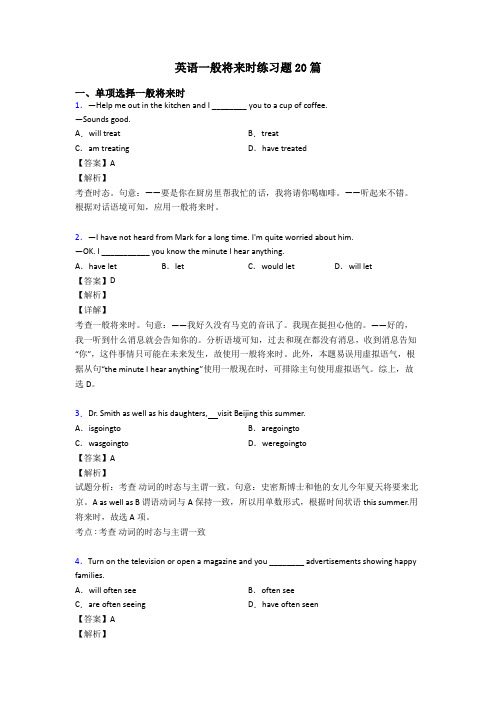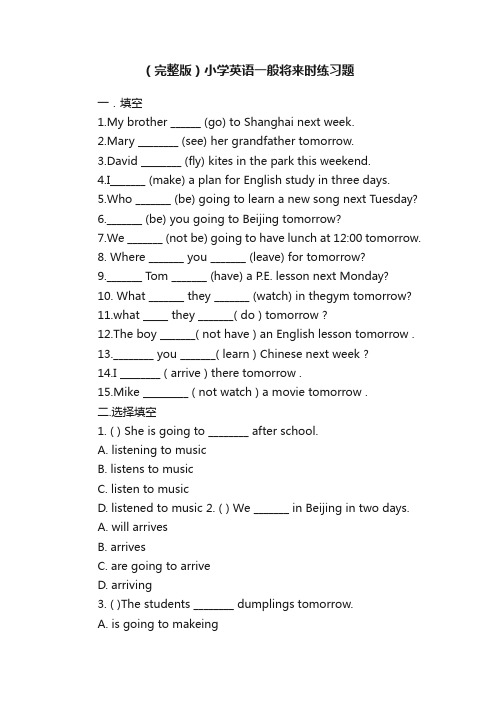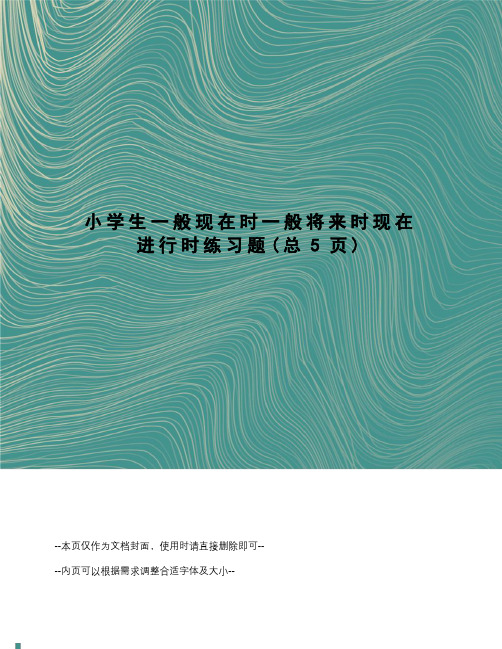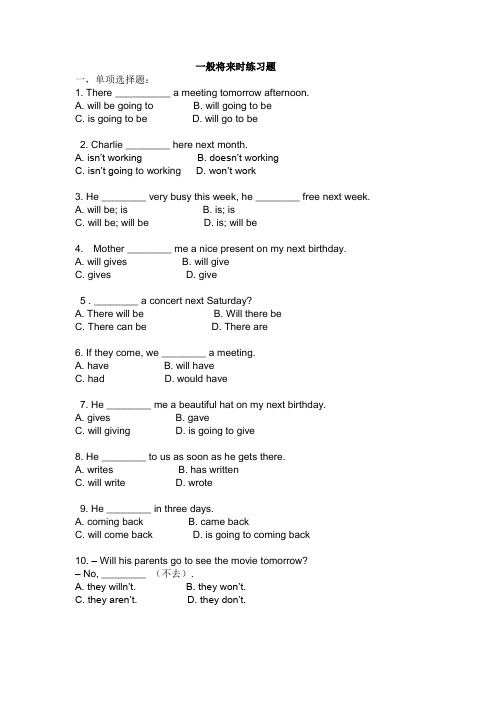乐加乐英语三年级暑假作业每日一练(18)——一般将来时
三年级英语一般将来时标志词练习题40题

三年级英语一般将来时标志词练习题40题1<背景文章>This weekend is coming. I am very excited. I am going to the park with my friends. We will play games in the park. We will fly kites. We will have a picnic. It will be a lot of fun.1. I am going to the park with my ___.A. parentsB. friendsC. teachersD. brothers答案:B。
中文解析:文章中明确提到“I am going to the park with my friends.”,所以答案是B。
2. We will ___ in the park.A. read booksB. do homeworkC. play gamesD. sleep答案:C。
中文解析:文章中有“We will play games in the park.”,所以答案是C。
3. We will fly ___.A. ballsB. birdsC. kitesD. planes答案:C。
中文解析:文中提到“We will fly kites.”,所以答案是C。
4. We will have a ___.A. partyB. concertC. picnicD. class答案:C。
中文解析:“We will have a picnic.”表明答案是C。
5. It will be ___.A. boringB. difficultC. badD. fun答案:D。
中文解析:文章最后说“It will be a lot of fun.”,所以答案是D。
2<背景文章>The family is very excited. They will go to the beach for a holiday.Mom is packing the bags. She puts in swimsuits, towels and sun cream. Dad is checking the car. He makes sure everything is ready. The children are looking forward to building sandcastles and swimming in the sea.6. What is Mom putting in the bags?A. BooksB. Swimsuits, towels and sun creamC. ToysD. Fruits答案:B。
英语一般将来时练习题20篇

英语一般将来时练习题20篇一、单项选择一般将来时1.—Help me out in the kitchen and I ________ you to a cup of coffee.—Sounds good.A.will treat B.treatC.am treating D.have treated【答案】A【解析】考查时态。
句意:——要是你在厨房里帮我忙的话,我将请你喝咖啡。
——听起来不错。
根据对话语境可知,应用一般将来时。
2.—I have not heard from Mark for a long time. I'm quite worried about him.—OK. I ___________ you know the minute I hear anything.A.have let B.let C.would let D.will let【答案】D【解析】【详解】考查一般将来时。
句意:——我好久没有马克的音讯了。
我现在挺担心他的。
——好的,我一听到什么消息就会告知你的。
分析语境可知,过去和现在都没有消息,收到消息告知“你”,这件事情只可能在未来发生,故使用一般将来时。
此外,本题易误用虚拟语气,根据从句“the minute I hear anything”使用一般现在时,可排除主句使用虚拟语气。
综上,故选D。
3.Dr. Smith as well as his daughters, visit Beijing this summer.A.isgoingto B.aregoingtoC.wasgoingto D.weregoingto【答案】A【解析】试题分析:考查动词的时态与主谓一致。
句意:史密斯博士和他的女儿今年夏天将要来北京。
A as well as B 谓语动词与A保持一致,所以用单数形式,根据时间状语this summer.用将来时,故选A项。
考点 : 考查动词的时态与主谓一致4.Turn on the television or open a magazine and you ________ advertisements showing happy families.A.will often see B.often seeC.are often seeing D.have often seen【答案】A【解析】考查“祈使句+and +陈述句”句型。
(完整版)小学英语一般将来时练习题

(完整版)小学英语一般将来时练习题一.填空1.My brother ______ (go) to Shanghai next week.2.Mary ________ (see) her grandfather tomorrow.3.David ________ (fly) kites in the park this weekend.4.I_______ (make) a plan for English study in three days.5.Who _______ (be) going to learn a new song next Tuesday?6._______ (be) you going to Beijing tomorrow?7.We _______ (not be) going to have lunch at 12:00 tomorrow.8. Where _______ you _______ (leave) for tomorrow?9._______ Tom _______ (have) a P.E. lesson next Monday?10. What _______ they _______ (watch) in thegym tomorrow?11.what _____ they _______( do ) tomorrow ?12.The boy _______( not have ) an English lesson tomorrow .13.________ you _______( learn ) Chinese next week ?14.I ________ ( arrive ) there tomorrow .15.Mike _________ ( not watch ) a movie tomorrow .二.选择填空1. ( ) She is going to ________ after school.A. listening to musicB. listens to musicC. listen to musicD. listened to music 2. ( ) We _______ in Beijing in two days.A. will arrivesB. arrivesC. are going to arriveD. arriving3. ( )The students ________ dumplings tomorrow.A. is going to makeingB. are makingC. will makeD. are make4. ( ) Are you going to_________ thirteen years old next year?A. will beB. areC. beD. go5. ( ) ___will see a play in 5 days?A. WhenB. WhatC. WhoD. Whose6. ( ) Mary______ English next year.A. will learnB. will to learnC. are going to learn.D. learns7. ( ) He’ll _____ shopping this afternoon.A. goingB. goC. goesD. went8. ( ) Will you ____ at the bus stop at 10:30?A. meetingB. meetsC. meetD. met9. ( ) Lily and I _______ the guitar. next week.A. am going to playB. are going to playC. will playsD. play10. ( ) How ______ Jenny ___ home tomorrow?A. does......goB. is……goingC. will……goD. do……go11. ( ) Who is going to _________ a song ?A. sings B singing C. to sing D. sing12. ( ) I _________in Beijing in three days.A. are going to arriveB. arriveC. will arriveD. arrives13. ( ) He _______some model planes tomorrow .A. going to makeB. is makingC. will make D makes14. ( ) Are you going to ___________a doctor next year ?A. will beB.. areC. beD. are going to15. ( ) She ________ you make supper this evening .A. helpsB. will helpC. is helpingD. is going help 三.把下列句子变成一般疑问句,并给出肯定和否定回答。
小学生一般现在时一般将来时现在进行时练习题

小学生一般现在时一般将来时现在进行时练习题(总5页)--本页仅作为文档封面,使用时请直接删除即可----内页可以根据需求调整合适字体及大小--小学英语时态总复习现在进行时、一般将来时、一般现在时综合练习一、写出下列动词的第三人称单数 drink __________ go _________ stay __________ make __________look ___________ have_________ pass_________ carry __________come__________ watch________ plant_________ fly __________study_________ brush__________ do___________ teach_________二、写出下列动词的现在分词play_________ run___________ swim __________make___________go__________like__________ write___________ ski____________ read_________ have__________ sing___________ dance___________put__________ see__________ buy ___________ love_____________ live__________ take___________ come __________ get___________stop__________ sit ___________ begin__________ shop___________三、单项选择1._____ he _____ to the park at 6:30 in the morningNo,he _____ .A. Does; goes; does B. Does; go; doesn’t C. Does; go; does2. Tim always _____ a picture at home. He _____ a car now. A. draws; is drawing B. draw; draw C. draws;draw3. Where are the man and the womanThey _____ near the tree. A. sit B. sat C. are sitting4. Open the window, Please. Look! He _____ it.A. opensB. is openningC. is opening5. Mr. Green often _____ his newspapers at night.But he _____ an interesting book tonight. A. reads; reads B. reads; read C. reads; is going to read6. The old man _____ playing sports in the park.He _____ morning exercise now. A. likes; is doing B. likes; does C. like; doing’m going to _____ some chopsticks ____ Sunday afternoon.A. bought; onB. buy; atC. buy;onuncle usually _____ some milk every day.A. drinkB. is drinkingC. drank9. _____ you _____ fishing every weekNo, we _____ .A. Does; go; doesn’tB. Do; go; doesn’tC. Do; go; don’t __ visit my friends this weekend.A. go toB. am going toC. going to四、用所给动词的适当形式填空often _____ (go) for a walk on Sundays.’s ______ (go) and _____ (see).are you ______ (go) to do tomorrowI’m ________ (go) to _______ (have) a picnic.4. What are you doingI’m _________ (have) an English lesson._______ (have) a good time every weekend.6. What are you going to do tomorrow?I’m going to ________ (have) a picnic.does she _______ (like)She ______ (like) _____ (take) photos8. My father _____ ____ (read) a newspaper now.usually _______(do) my homework at seven o’clock.girls _____________ (sing) and _____________ (dance) at the party now.。
小学一般将来时的练习题

小学一般将来时的练习题小学一般将来时的练习题小学生学习英语的过程中,一般将来时是一个重要的语法知识点。
掌握一般将来时的用法对于学生们的英语学习至关重要。
下面是一些小学一般将来时的练习题,帮助学生们巩固和运用这一知识点。
练习题一:选择正确的动词形式填空1. Tomorrow, I _______ (go/goes) to the park with my friends.2. My sister _______ (watch/watches) a movie tonight.3. We _______ (play/plays) soccer after school tomorrow.4. They _______ (visit/visits) their grandparents next week.5. The cat _______ (jump/jumps) off the table in a moment.练习题二:改写句子,使用一般将来时1. I have a piano lesson on Saturday. (改写为一般将来时)2. She goes to the library every Sunday. (改写为一般将来时)3. They visit their cousins in the summer. (改写为一般将来时)4. We eat dinner at 6 o'clock. (改写为一般将来时)5. He plays basketball after school. (改写为一般将来时)练习题三:根据提示写出句子,使用一般将来时1. (I / read / a book / tomorrow)2. (She / visit / her grandparents / next month)3. (We / have / a picnic / this weekend)4. (They / go / to the beach / in the summer)5. (He / watch / a movie / tonight)练习题四:阅读理解,选择正确的答案Tomorrow is Saturday. Lucy _______ (is going to go / goes) to the zoo with her family. They _______ (is going to see / see) many animals there. Lucy _______ (is going to take / takes) her camera to take pictures. They _______ (is going to have / have) a picnic in the park near the zoo. Lucy's brother _______ (is going to play / plays) soccer with his friends. They _______ (is going to have / have) a fun day together.1. What are Lucy and her family going to do tomorrow?a) Go to the zoob) Go to the parkc) Go to the library2. What is Lucy going to take to the zoo?a) Her camerab) Her bookc) Her toy3. Where are they going to have a picnic?a) In the zoob) In the park near the zooc) In their house4. What is Lucy's brother going to do?a) Play soccerb) Play basketballc) Play tennis5. Are Lucy and her family going to have a fun day?a) Yesb) Noc) Maybe以上是一些小学一般将来时的练习题。
一般将来时练习题(完整版)

一般将来时练习题一,单项选择题:1. There __________ a meeting tomorrow afternoon.A. will be going toB. will going to beC. is going to beD. will go to be2. Charlie ________ here next month.A. isn’t workingB. doesn’t workingC. isn’t goin g to workingD. won’t work3. He ________ very busy this week, he ________ free next week.A. will be; isB. is; isC. will be; will beD. is; will be4. Mother ________ me a nice present on my next birthday.A. will givesB. will giveC. givesD. give5 . ________ a concert next Saturday?A. There will beB. Will there beC. There can beD. There are6. If they come, we ________ a meeting.A. haveB. will haveC. hadD. would have7. He ________ me a beautiful hat on my next birthday.A. givesB. gaveC. will givingD. is going to give8. He ________ to us as soon as he gets there.A. writesB. has writtenC. will writeD. wrote9. He ________ in three days.A. coming backB. came backC. will come backD. is going to coming back10. – Will his parents go to see the movie tomorrow?– No, ________ (不去).A. they willn’t.B. they won’t.C. they aren’t.D. they don’t.二、连词成句。
(完整版)小学英语一般将来时讲解及练习
小学英语一般将来时讲解及练习一、一般将来时的定义:一般将来时表示在将来时间将要发生的动作或存在的状态,与表示将来的时间连用。
tomorrow, next day(week, month, year…),soon, the day after tomorrow(后天)等。
如:She will visit Shanghai tomorrow.二、一般将来时的构成1.一般将来时有两种构成形式:(1)主语+shall/will+do(2)主语+ be going to + do 在表示“打算到某地去时”由于谓语动词go与going重复,一般可以只说be going to a place。
三、一般将来时的用法1.(1)主语+shall/will+do (will可用于所有人称,shall只用于第一人称I和we) 这种结构不是表示自己的打算、意图或计划,而是表示未来的事实或对将来的预测等如:No one will do heavy work.Roberts will do everything for us.(2)主语+ be going to + do这种结构常用来表达自己打算做某事、计划做某事或者有意做某事。
注意:be 动词要与主语的人称和数一致,如:I am going to do some reading tomorrow.He is going to have a piano lesson next week.We are going to have a party this Friday.2.通常情况下will 和 be going to能互换,但是be going to 与will用法的也是有点区别的(1)只用will不用be going to的情况:①表示对未来时间与年龄的推测时,如:Tomorrow will be Monday.She will be thirteen next year.②表示必然发生时,如:Fish will die without water.People will die if all green plants die.(2)只用be going to而不用will的情况:如果表示已有迹象表明在不久的将来要发生的事情时,如:Look at those black clouds, It’s going to rain.3.某些动词如:go/come/leave/start/begin/arrive等,它们的现在进行时可以表示将来时,如:They are leaving for Shanghaitomorrow.My brother is coming here soon.四、一般将来时的句式变换肯定句:主语+shall/will+do主语+ be going to + do否定句:主语+shall/will+not+do(will not 可缩写成won’t)主语+ be+ not+ going to +do一般疑问句:shall/will+主语+ dobe+主语+going to+do特殊疑问句:疑问词+ shall/will+主语+do疑问词+be+主语+going to+do一般将来时练习题:一、用单词的适当形式填空。
一般将来时讲解(附习题+答案)
一般将来时讲解(附习题+答案)一、一般将来时的含义:表示动作发生在将来二、一般将来时的句型:(1) will/shall+动词原形(2) be going to+动词原形三、一般将来时的时间状语:tomorrow(明天)、the day after tomorrow(后天)、next...(下一...): next week(下一周)、next year(明年)、next month(下个月)in+一段时间(...之后): in three days(三天之后)、in the future在未来this evening(今天晚上)四、一般将来时的句型结构:(1) will/shall+动词原形(will not =won’t)(will 各种人称均可用,shall 只能用于第一人称)1)肯定句:主语+will/shall+动词原型...如:I will go to school tomorrow.我明天将会去学校He will go to school tomorrow.他明天将会去学校。
2)否定句:主语+will/shall+not+动词原型...如:I won’t go to school tomorrow.我明天将不会去学校。
He won’t go to school tomorrow.他明天将不会去学校。
3)一般疑问句:Will/Shall +主语+动词原型...如:Will you go to school tomorrow?你明天要去学校吗?Will he go to school tomorrow?他明天要去学校吗?肯定回答:Yes, 主语+will.如:Yes, I will.Yes, he will.否定回答:No,主语+will+not.如:No, I won’t.No, he won’t.4) 特殊疑问句:特殊疑问词+will/shall+主语+动词原型...如:What will you do tomorrow?你明天将会做什么?What will he do tomorrow?他明天将会做什么?(2) be going to+动词原形1)肯定句:主语+be going to +动词原型...如:I am going to buy some books tomorrow.我明天打算去买一些书。
一般将来时(附讲义和答案)
牛津英语7b英语语法(三)一般将来时一、一般将来时的动词形式一般将来时表示将来某个时间将要发生的动作或存在的状态,也表示将来经常或反复发生的动作。
一般将来时由助动词shall或will加动词原形构成,shall用于第一人称,will用于第二、三人称。
但是现在第一人称一般也用will,其区别并不明显。
(或“be going to + 动词原形)常与tomorrow, next… , in (the)future,soon, in five days,in two weeks等连用。
如: I shall not come if it rains tomorrow.如明天下雨我就不来。
My father will leave for China next week.我的爸爸下星期要到中国去。
“I’ll, You’ll, He’ll , She’ll , It’ll, We’ll , They’ll …”是简缩形式。
二.一般将来时的句型1.肯定句:主语+shall /will+动词+其他成份The workers will build a new school here next year.工人们明年将在这儿盖一所新学校。
They will go shopping this afternoon. 今天下午他们将要去购物。
We shall have a delicious dinner tonight. 今晚我们将美餐一顿。
We shall be there before dark. 我们天黑前会到达那里。
2.否定句:主语+shall /will+not+动词+其他成份She won’t come back this week.这一周她不回来了。
I will not go shopping one hour later. 一小时之后我不会去购物。
He won’t play football with you before he finishes his work.他干完活后才能跟你踢足球。
一般将来时讲解+练习题
一般将来时讲解+练习题一般将来时练习题知识要点一般将来时一、概念:表示将要发生的动作或存在的状态及打算、计划或准备做某事。
时间状语:tomorrow, the day after tomorrow(后天),this morning/ afternoon/ evening/weekend, next day (week, month, year…), soon, one day(将来某天),in+一段时间,in the future.等二、基本结构:①be(am/is/are) going to +动词原形;②will+ 动词原形.(1) be (am/is/are) going to +动词原形,表示主语将要进行某一行动的打算、意图,“打算干什么”。
如:I am going to play basketball with my friends this afternoon(2) be (am/is/are) going to +(the) 地点名词,表示“准备去…”。
如:I am going to Beijing/ the zoo with my mum this weekend.(3) be (am/is/are) going to 结构,可表示说话人确信如此或某种迹象表明某事即将发生如: Look at those clouds! It’s going to rain.注意:be going to 与will一般情况下可以互相替换。
以下情况不可替换:(1)在表示身体不适(sick等)的句子中, 只可用be going to。
(2)表示某种迹象表明某事即将发生(如天气变化)时,只可用be going to 如:I am going to go swimming tomorrow. (同义句) = I will go swimming tomorrow.(1) I am going to be sick by cable car/ be ill (have a fever ) in the rain.(2) Look at those clouds! It’s going to rain.三、一般将来时的句型变化:1.肯定句:主语+ be(am/is/are) going to +动词原形或主语+ will + 动词原形. +动词原形否定句: (1)在be动词(am, is, are)后加not (2)情态动词will后加not成won’t. Eg:I’m going to have a picnic this afternoon.→ I’m not going to…..I will have a picnic this afternoon. → I will not (won’t) …2.2.一般疑问句:一调二改三问号(1)be或will调到句首(2)第一二人称互换:I/we – you;and改为or(否定与疑问句);some改为any;例如:We are going to buy some food and fruit this weekend. 或We will buy some…Are you going to buy any food or fruit this weekend? 或Will you buy any…? 3.特殊疑问句:who, what, where, when, how等特殊疑问词。
- 1、下载文档前请自行甄别文档内容的完整性,平台不提供额外的编辑、内容补充、找答案等附加服务。
- 2、"仅部分预览"的文档,不可在线预览部分如存在完整性等问题,可反馈申请退款(可完整预览的文档不适用该条件!)。
- 3、如文档侵犯您的权益,请联系客服反馈,我们会尽快为您处理(人工客服工作时间:9:00-18:30)。
乐加乐英语三年级暑假作业每日一练(18)——一般将来时
乐加乐英语三年级暑假作业每日一练(18)——一般将来时
一、用所给动词的适当形式填空
1.Jim and Li Lei _______________________________(watch)the football match this evening.
2.__________ she ______________________________(have)a Chinese lesson tomorrow?
3.—What __________ you _______________________________(do)tomorrow morning?
—I ___________________________________(see)my grandparents.
4.__________ they_______________________________(go)fishing this Friday afternoon?
5.There _______________________________________(be) a birthday party this evening.
二、按要求改写下列各句
1.We are going to play Ping-Pong on Saturday.(改为一般疑问句并作否定回答)
—__________ __________ going to play Ping-Pong on Saturday?
—__________,we __________.
2.He's going to tell me all about it.(改为否定句)
He __________ __________ going to tell me all about it.
3.She is going to work hard at English this term.(对划线部分提问)
__________ she __________ __________ __________ this term?
4.They're going to the Sun Island by bus.(对划线部分提问)
__________ __________ they __________ __________ the Sun Island?
5.The students of Class Three have a field trip on Sunday.(用next Sunday改写)
The students of Class Three __________ __________ __________ __________ a field trip next Sunday.
6.Linda has lunch at school on Tuesdays.(用next Tuesday 改写)
Linda __________ __________ __________ __________ lunch at school next Tuesday.
三、把下列各句译成英语
1.我叔叔今晚要来。
My uncle __________ __________ __________ __________ tonight.
2.他没有打算住那座小屋。
He __________ __________ __________ __________ in the small house.
3.我们要读这本书。
We __________ __________ __________ __________ this book.
4.———你爸爸要去钓鱼吗?—__________ your father __________ ______ _________?
———不,他要去游泳。
—No,he is __________ __________ ___________.。
